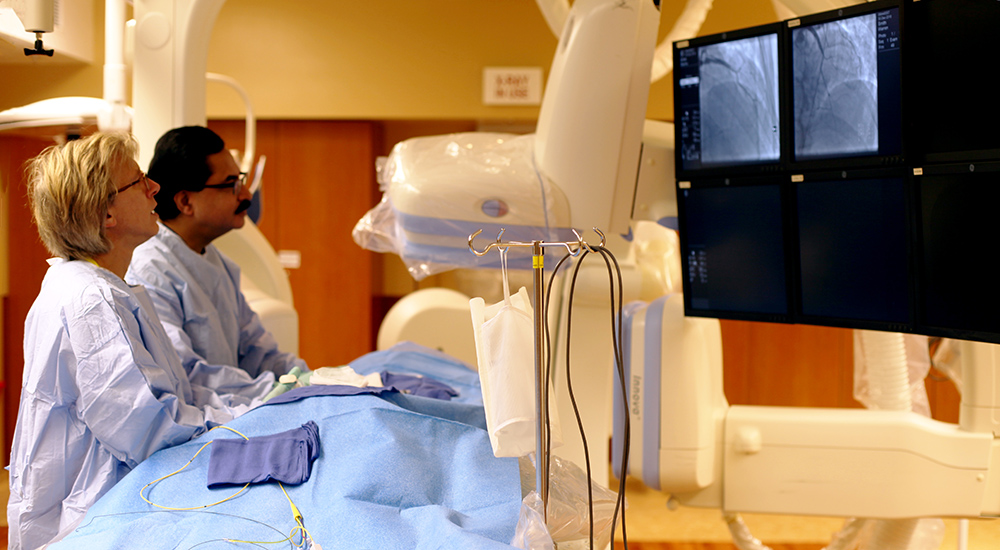Cardiac catheterization is a procedure that examines how well the heart is working. A thin, hollow tube called a catheter is inserted into a large blood vessel leading to the heart. The results of the procedure tell doctors if patients have diseases of the heart muscle, valves or coronary arteries.
Wilkes-Barre’s team of cardiologists, nurses, and technologists is skilled in all aspects of catheterization care. They understand procedures involving the heart can be particularly stressful, and do all they can to address and alleviate Veterans’ concerns.
At the medical center, cardiac catheterizations are performed in a state-of-the-art suite. The suite is equipped with the latest technology, including biplane imaging (which allows doctors to follow the path of blood through blood vessels and create a roadmap for reaching and treating the precise location of problems) and three-dimensional mapping.

Wilkes-Barre’s Cardiac Catheterization Suite features state-of-the-art biplane imaging and three-dimensional mapping capability.
In cardiac catheterization, the catheter can be inserted into either the radial artery in the wrist or the femoral artery in the groin area. The vast majority of catheterization procedures done at Wilkes-Barre today are radial catheterizations, in which a flexible catheter is inserted into the wrist.
Benefits of the radial process, compared to femoral catheterizations, include a reduced risk of bleeding, getting people on their feet more quickly, and increased comfort. Veterans who undergo radial catheterizations are usually done two hours after the procedure is completed. In Wilkes-Barre, they spend the two hours in the catheterization lab recovery room, relaxing in heated massage recliners.
Every year, the cardiac catheterization team treats more and more Wilkes-Barre-area Veterans, so patients no longer need to travel to VA medical centers in Philadelphia and New York for care. This means that they no longer have to face invasive procedures in unfamiliar settings, without loved ones by their side.
The cardiac catheterization team, and the new lab, is another demonstration of how Wilkes-Barre improves the Veteran experience by using the latest medical technology to produce the best possible outcome for Veterans.
About the author: Kristina Griffiths RN, MSN is a Nurse Manager, at the Cardiac Cath Lab, Wilkes-Barre VA Medical Center
Topics in this story
More Stories
Bob Jesse Award celebrates the achievements of a VA employee and a team or department that exemplifies innovative practices within VA.
The Medical Foster Home program offers Veterans an alternative to nursing homes.
Watch the Under Secretary for Health and a panel of experts discuss VA Health Connect tele-emergency care.







How does the VA Hospital in Birmingham Alabama rank.?
How does the VA hospital in Gainesville, Fl, measure up with the cardiologists in Wilkes-Barre and Atlanta?….or Orlando, Fl?
Atlanta VA heart doctors are mostly trained at Emory University which is next door. In my opinion the best VA hospitals are the ones with a medical school close by, these hospitals are training hospitals. You have the instructors semi retired doctors over seeing different departments that they specialized in. In cardiology Dr Peter Block, helped develop the heart Cath. Dr Safari(sp?) oversees on Wednesday. Dr Kumar does all my heart Caths he is wonderful he is the man keeping me alive!
To the veteran who asked, “How many patients die because of cardiac catheterization?. I ask,” How many lives are saved because of the test?. Many!
To whom who reads this call your Representative and your Senators asked them to contact the Senate Side and the House side of the Veteran Affairs Committee passed a New Veteran Disabled Benefit Law which is if a Disabled Veterans who is collected 100 percent service connected definitely need to have G4implants from a Cosmetic Dentistry Dentist because their is not one works for a Veteran Medical Center plus their isn’t not one has a contract with Veteran Affairs Admistratation but they have a Private Clinics know how to put in G4implants unfortunately they want all the money upfront but my belief as a Veteran myself the money should come From the Federal Government so the Disabled Veterans who is collected 100 percent service connected get the G4implants for free also three quarters of the Disabled Veterans who is collected 100 percent service connected can’t even afford to get a loan to get the G4implants plus if Disabled Veterans don’t get the G4implants it causes other Health problems issues…..Thanks for Your Support and Stay Healthy and your Family remember that I can’t do it alone plus Spread my belief as a Concerned Veteran.
I have seven stents and on my 4th diffibralator . besides several other procedures at the Atlanta VA hospital. Excellent care. I am 81 years old.
I also go to Atlanta VA and am getting the finest medical care in the world. I have 24 stints, triple by pass and on second diffibralator. Agent Orange South Korea 1968 and 1968. I did not know until Atlanta V A told me!
How many veterans have died in the past and how many die annually from this examination? I’m sure there are many that die from plague breaking lose during the procedure. Sure there is a better way to test. This seems like a very high risk for some patients, especially those exposed to A O.